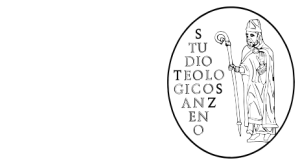
Numero 5
Divenire Chiesa: soggetti e comunità
Gennaio - Dicembre 2021
Abstract e allegati
di Luca MerloFull Text
di Giuseppe AccordiniFull Text
Abstract
The reflection on the intelligibility of the Church is congruent to post-idealistic philosophy, language and communication. Schelling and the Frankfurt School bring back the sense of temporality and contingency in the relationship between world and absolute. In this context, the appearance of the subject is featured as science of experience of knowledge. The transcendent and the transcendental are always mediated by history of conscience. Abstract language becomes speech and the revelation becomes history. The idea of Kingdom temporalizes God's self-revelation in Jesus, and the function of the Church. Thus, the Church cannot be deducted based on its mere historical manifestations. Hence, the Church can be said to be founded on Jesus rather than by Jesus, and so the Church is the historical act of dialogue of a God who is present in it in an indirect and exceeding manner. Jesus's messianism is grounded on him being the Son of God. The Word and the Spirit save the Church from collectivism and individualism. The Church is the sacrament of the Spirit and also the continuous crisis of the Spirit. This means for the Church to become both communication without dominance and reciprocal acknowledgement of the individual identity, avoiding a suffocating collectivism and a freezing individualism which suffocate and freeze all things, including the Kingdom of God.
Ssommario
La riflessione sull’intellegibilità della Chiesa è in sintonia di fondo con la filosofia postidealistica, del linguaggio e della comunicazione postmoderna. Schelling e la scuola di Francoforte recuperano il senso della temporalità e della contingenza nel rapporto del mondo con l’assoluto. L’emergere del soggetto in questo contesto si caratterizza come scienza dell’esperienza della coscienza. Il trascendente e il trascendentale sono sempre mediati dalla storia della coscienza. Il linguaggio astratto pertanto diventa discorso e la rivelazione diventa storia. La figura del Regno temporalizza l’autorivelazione di Dio in Gesù e anche la funzione della Chiesa. La chiesa in questo senso è indeducibile dalle pure manifestazioni storiche irriducibile ad esse. Pertanto, si può dire fondata su Gesù più che da Gesù ed è quindi l’autocomunicazione storica di un Dio che è presente in essa in modo indiretto ed eccedente. Il messianismo di Gesù è fondato sulla sua figliolanza divina. La Parola e lo Spirito sottraggono la chiesa al collettivismo e all’individualismo. La chiesa è il sacramento dello Spirito e anche la perenne crisi dello Spirito. Qu esto comporta che la chiesa diventi comunicazione senza dominio e riconoscimento reciproco anche dell’identità del singolo che sfugge alla collettivizzazione che tutto soffoca e all’individualismo che tutto gela, compreso il futuro del Regno di Dio.
di Gianattilio BonifacioFull Text
Abstract
The Lordship of God included in Jesus's proclamation of the Kingdom proposes a lifestyle which affects the practicality of the historical situation but which, at the same time, remains open to a fulfilment that acknowledges the provisional status of any worldly solution. Jesus encourages a new type of relationship which is based on God's Lordship and which determines a critique of the patriarchal and power systems (the new family). The claim of the eschatological horizon of the Kingdom, which feeds into a practical rethinking of the polis, represents a decisive proposal also for the contemporary Church.
Sommario
La signoria di Dio, che emerge dall’annuncio del Regno di Gesù, propone un originale stile di vita che incide sulla concretezza delle condizioni storiche, ma – nel contempo – resta aperto ad un pieno compimento che riconosce la provvisorietà di ogni soluzione mondana. Gesù ha promosso un’innovata modalità di relazioni interpersonali che, imperniate sulla sovranità di Dio, hanno determinato anche una critica del sistema patriarcale e di potere (la nuova famiglia). La rivendicazione dell’orizzonte escatologico del Regno, che alimenta una concreta proposta di ripensamento della polis, costituisce un appello decisivo anche per la chiesa contemporanea.
di Gabriele BordoniFull Text
Abstract
The article intends to suggest some key steps for a possible road map of sociological rethinking of the complexity of the community topic, a path that represents a long-standing challenge. This path leads to shifting the attention from a self-centered, structural, prescriptive, antithetical definition of community to a definition of community as an entity that understands itself upon consideration of its approach to dialogue with the outside / other / elsewhere. Based on the reflective elements collected along the way, the article ultimately proposes the possibility of dialogue with ecclesiastic paths to reformulate the meaning of believing community, starting from and for the scope of discipleship in its reference to evangelical otherness.
Sommario
L’articolo intende indicare alcuni passaggi nodali di una possibile roadmap per un percorso di ripensamento sociologico della complessità del tema comunità come sfida che continuamente si ripropone. Tale percorso porta a spostare l’attenzione da una definizione di comunità di tipo autocentrica, strutturale, prescrittiva, oppositiva alla delineazione di una comunità che si autocomprende in riferimento alla soglia con cui essa entra in dialogo con il suo fuori/altro/altrove. Con gli elementi riflessivi raccolti lungo il percorso, si prospetta infine la possibilità di dialogare con i percorsi ecclesiologici per riformulare il significato della comunità credente a partire dal e in funzione del discepolato nel suo riferimento all’alterità evangelica.
di Luca MerloFull Text
Abstract
We are experiencing a Synode about synodality, in which first local churches are involved and then the assembly. For the Church this is a challenge which could, however, become advantageous for measuring the actual opportunity to reactivate a more credible forma ecclesiae, that could involve all of the people of God. Synodality is, therefore, not only about contents, but about a style which is also one of the main features of this pontifi cate. The people of God, synodality and reform are three words which echo each other during Pope Francis's ministry, reaching the whole of the current theological, pastoral and canonical discourse. These three words also constitute the plot of this piece.
Sommario
Stiamo vivendo un Sinodo sulla sinodalità, che vede il coinvolgimento dapprima delle Chiese locali e poi dell’assemblea vera e propria. Per la Chiesa tutta si tratta di una sfida che potrebbe trasformarsi in una grazia per misurare la reale disponibilità a riattivare una forma ecclesiae più credibile, che coinvolga l’intero popolo di Dio. La sinodalità quindi non riguarda anzitutto un contenuto, ma uno “stile” che rimanda anche ad uno degli elementi qualificanti di questo pontificato. Popolo di Dio, sinodalità e riforma sono tre parole che si rincorrono e si richiamano continuamente nel magistero di Francesco, investendo anche l’attuale riflessione teologica, pastorale e canonistica. Tre parole che costituiscono anche la trama del presente contributo.
di Cristina SimonelliFull Text
Abstract
We present here a brief content which has the aim of lifting ourselves above ideological fences, in order to interpret something which is usually only inferred in most of the ecclesiastic literature; this is because it is considered irrelevant, not worthy of a review or merely obvious. The article is developed in three points: the awareness of the need of rethinking masculinity, unless we want to make the theoretical discourse and any attempt at reform inconclusive; the review of some studies in which the baptismal identity is presented with inclusive terms; the concretization of the topic in some of its key areas: synodality, mystery, ministry, proximity. The conclusion gathers the topic, in an ecumenical way, around the communion of saints, both in depths and destination.
Sommario
Presentiamo una breve ricognizione con la semplice intenzione di attraversare le recinzioni, interpretando quanto a volte è, probabilmente, solo sott inteso in molta produzione ecclesiologica: perché ritenuto irrilevante, non meritevole di recensione o forse semplicemente ovvio. L’articolo si sviluppa attorno a tre nodi: la consapevolezza che si tratti in primo luogo e soprattutto di ripensare la maschilità, pena l’irrilevanza dei dibattiti teorici e l’inconcludenza dei processi di riforma; la recensione di alcuni studi nei quali l’identità battesimale è svolta in termini esplicitamente inclusivi; l’esemplificazione del tema attraverso alcuni dei suoi luoghi sensibili: sinodalità, ministerialità, prossimità. La conclusione raccoglie il tema in forma ecumenica attorno alla comunione dei santi, sia nel senso della profondità che della destinazione.
di Enzo Biemmi ed Ezio FalavegnaFull Text
Abstract
The article presents the continuity, not without diversity, of the Synode of the Church of Verona (happened at the beginning of 20th century) through the current universal Synode on synodality. The common feature of these paths is the need to find a new style of Church, on the wave of a new historical era which forces us to walk in a new territory in which Gods awaits us. For this to happen we need to truly and deeply consider the treasures which we already own, verify them to enhance them and, if necessary, convert them. An example of this task can be found in the synodal path of the Church in Verona, which is now in symmetry with the path outlined by the 'Evangelii Gaudium', in the process which was triggered by the Synode of the universal and Italian Church. These two paths share the idea of a Church which is ready to listen to the Word and the manifold words and lives of people, a Church which is willing to become authentic by rediscovering its own identity and to communicate the Gospel with words which are relevant in our time. These are three important and feasible aspects which, together, can unveil paths which aren't only simple communication strategies, but true testimony and proclamation of the Gospel. Considering the experience of the Church of Verona allows us to acknowledge the Synode as a time of grace and, although it is faced by some criticism, to state that it is an extraordinary exercise for the Church.
Sommario
L’articolo presenta la continuità, pur nella diversità, tra il cammino sinodale proposto dal Sinodo universale sulla “sinodalità” e quello vissuto agli inizi del secolo dalla Chiesa di Verona. Sono percorsi accomunati dall’esigenza di assumere un nuovo stile di Chiesa, provocati dal momento storico a porci sui nuovi terreni in cui il Signore ci attende. Perché questo avvenga occorre guardare in profondità le ricchezze che già ci appartengono, saper narrarle, verificarle, in modo tale da valorizzarle e, se necessario, riconvertirle. Una traccia di questo compito è rinvenibile nel cammino sinodale vissuto nella Chiesa di Verona e ora contrassegnato da una singolare sintonia nel ricco solco tracciato dalla “Evangelii gaudium”, nel processo attivato dal Sinodo della Chiesa universale e quella italiana. Li accomuna uno stile di Chiesa disposta a porsi in ascolto della parola di Dio e delle molteplici parole e dei vissuti delle persone, desiderosa di diventare lei stessa autentica, cioè di riscoprire la propria identità, di comunicare il Vangelo con parole significative per il nostro tempo. Sono questi tre aspetti importanti e percorribili che insieme possono indicare percorsi che non si confondono con delle semplici strategie operative, ma si qualificano come testimonianza e annuncio del Vangelo. Guardare a quanto vissuto nel cammino di una Chiesa come quella di Verona, permette di riconoscere nel Sinodo un “tempo di grazia” e, pur con le inevitabili resistenze, affermare che esso è una straordinaria palestra di Chiesa.
di Roberto VincoFull Text
Abstract
We are going through one of the most complex and difficult times in our era. The pandemic has brought the whole world on its knees. It forced us to stop and think. What to do? We must contrast easy slogans, such as 'all will be well', and also the language of fear and closed-mindedness, with projects to reimagine and reconstruct the future responsibly. This general crisis is also a call to our Christian communities. The dramatic moment we are living through can truly become a kairos, a time of opportunity, to try and concretize a real, radical change of the life of our parishes. The synodal path proposed by Pope Francis for the global Church could be the chance to create 'not another church, but a different church'.
Sommario
Stiamo attraversando uno dei momenti più complessi e difficili della nostra epoca. La pandemia ha messo in ginocchio il mondo intero. Ci ha costretti tutti a fermarci e a pensare. Che fare? Ai facili slogan “andrà tutto bene”, a chi continua ad usare il linguaggio della paura e della chiusura, occorre contrapporre progetti pensati per immaginare e costruire con responsabilità il futuro. Qu esta crisi generale interpella anche le nostre comunità cristiane. Il momento drammatico che stiamo vivendo, può diventare un “kairos”, un tempo opportuno, per tentare di realizzare un vero cambiamento radicale della vita delle nostre parrocchie. Il cammino sinodale, proposto da papa Francesco alla chiesa mondiale, potrebbe diventare l’occasione per realizzare “non un’altra chiesa, ma una chiesa diversa”.
di Paolo PoliFull Text
di Andrea MagnaniFull Text
di Augusto BarbiFull Text
Numeri precedentiVedi tutti

Alla ricerca dei ministeri battesimali
Vai al sommario

Teologia e formazione. Studi in memoria di don Serio De Guidi
Vai al sommario

Salvati per Gesù, morto e risorto
Vai al sommario

La Parola di Dio nelle parole umane. Contributi degli studenti
Vai al sommario





